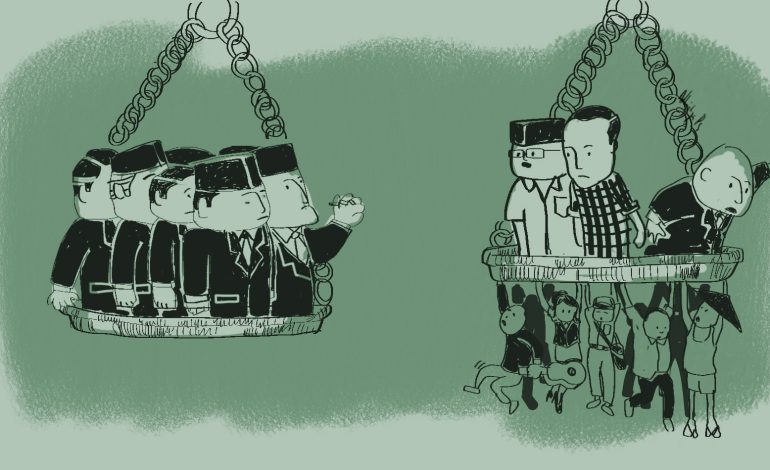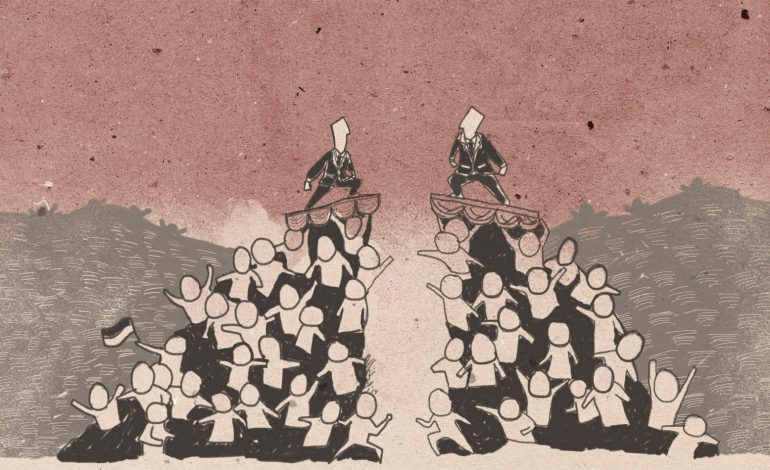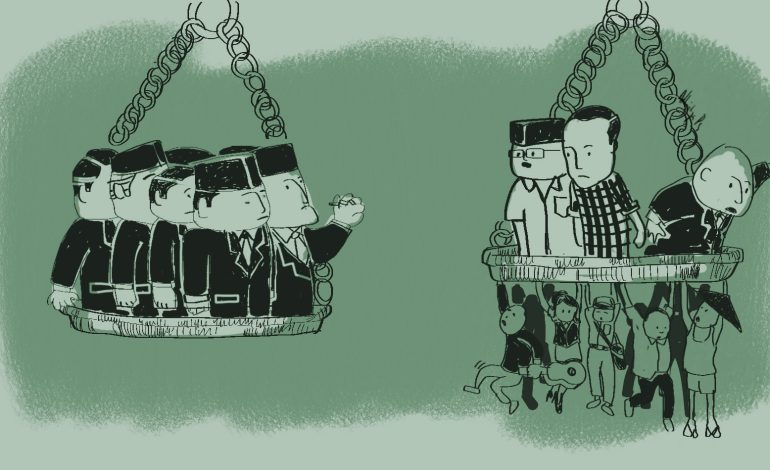Remember the Past, Choose the Better Candidate

There are at least four types of people in Indonesia based on the way they conduct themselves in this election season.
They are those passionate supporters of either of the two candidates; those who claim to be neutral, but show contempt of one or the other candidate; those who cannot express their political leanings for professional reasons; and those who remain quiet – too unnaturally quiet – about the whole thing.
I have a theory about why the fourth group is loath to express their opinions.
They may be undecided voters, or they may prefer to hide their preference to avoid conflicts with people with differing opinions in their milieu. But there’s another possible reason: they may have been taught to believe that politics is not the business of ordinary people. I can relate with this last group, for I was raised like them.
It’s not that my parents have no political exposure. My father was among the 1960’s student activists who protested against Sukarno’s troubled government and supported the rise of the Soeharto regime. Although politics was his passion, family eventually made him choose a career in banking.
I was a middle class kid, happily going about my business as a teenager like millions other children of Soeharto’s New Order generation. We believed that Indonesia was a special country inhabited by friendly and cultured people, a country rich in natural resources and protected from the enemies (the communists and the radicals) thanks to the army and our national ideology Pancasila.
Every five years the nation voted for one of the three political parties to sit in Parliament, which will then automatically reelected Soeharto, whom we called the Father of Development. This was the democracy that we knew.
Of course we knew about the business tentacles of Soeharto’s family and cronies controlling the biggest chunk of the economic pie, but we presumed it was how things were done.
We barely raised issue about imperious officials abusing their powers. If you were a Cabinet minister or a directorate general you’d be an anomaly if you didn’t live in a mansion with a garage full of luxury cars. In fact, I knew from my parents that high-ranking officials who were not rich were scorned by their colleagues for being “too idealistic”, a code word for fools or the nonconformists out to make others look bad.
The young me was hardly aware that in Aceh, Irian Jaya (now Papua and West Papua) and East Timor (before it broke free from Indonesia) many were dying and millions were living in fear under the grip of military operations to suppress separatist movements.
Though we celebrated Imlek (Chinese New Year) with our family friends, it would be two more decades before it was made a national holiday, and no one dared say “Gong Xi Fa Cai” out in public. I also had no idea that many Chinese Indonesians had difficulties getting state ID cards and had been forced to change names into Indonesian-sounding ones. Somehow it seemed normal that we never saw an ethnic Chinese face in the bureaucracy, much less holding a public post.
I never read in the press about how the offspring and relatives of former communists and communist sympathizers couldn’t get proper schooling or jobs because of the stigma they carried. I was uninformed about the suppression of Muslim and pro-democracy activists. And whenever another newspaper or magazine was shut down for their critical reports on the government, I understood that it was the media’s fault.
I lived happily in my bubble – a successful product of a regime that kept its young people apolitical, apathetic and uncritical.
One day in 1989, at the time an exchange student in a high school in the United States, I was being examined by a doctor, when he asked me where I was from.
“Ah, Indonesia!” he looked at me with studied interest when I told him.
“You have had the same president for 20 something years, right? How can he stay in power that long?”
I was ashamed for not having the answer to his question. Until that day, I never thought about how long Soeharto had been in power, or why we couldn’t have a real election to vote for a president. Politics was not something to discuss at home, not in that way. Only the government and politicians had the privilege of doing it. Those who dared question risked being called “subversive”.
Next week’s election will determine the direction Indonesia will choose. One path is strongly connected to its darker past — a part of history now at a risk of being whitewashed, even glorified — while the other one ensures we continue on the path of democracy, however rough it may be.
It was towards the end of the Soeharto regime in 1996, when I returned to Indonesia from the States to become a journalist for The Jakarta Post. Because it’s an English publication, we could be slightly more critical than other papers and escaped the daily scrutiny of the Information Ministry by being a little subtle in our writing.
The political climate was at its most repressive, however. Pro-democracy activists had been disappearing – and only much later we found out that they were abducted and tortured by an army Special Forces team (of the 23 abducted, nine were released after the regime collapsed, one was found dead, and the rest had not been heard of). The government has tightened its grip on the press, and self-censorship was at its highest among apolitical middle class people like my parents, who would hush me when I excitedly talked about politics, lest I got “picked up” by the authority like one of their friends’ daughter.
And then the Asian economic crisis hit. Student protests escalated, riots broke out, the media became more daring, and Soeharto’s own Cabinet eventually stood up against him. On May 21, 1998 he resigned, and the era of Reformasi began.
TODAY
That takes us to where we are today, 16 years later.
Next week’s election will determine the direction Indonesia will choose. One path is strongly connected to its darker past — a part of history now at a risk of being whitewashed, even glorified — while the other one ensures we continue on the path of democracy, however rough it may be.
In the first three decades of my life, I didn’t have the luxury of choosing my own President, so now I’m urging you to make sure that we will not go back to that place.
Will we vote for a general who was cashiered from the military for leading the activists’ abduction? Or will we choose the country’s first-ever presidential candidate who is not a part of the political elites?
We now have the options between a person who has spent the last 10 years as an elected official with breakthroughs results and one who has never held any leadership position in a civilian government institution.
We have a choice between a leader who promotes the values of integrity and hard work ethics by changing individual mindset and one whose rhetoric leans towards fear mongering and rousing enmity against an external “enemy” (whether it’s the foreign factor, the enemies of Islam, or the communists).
It also comes down to choosing politics unusual versus the heavily transactional politics-as-usual.
It is a choice of a leader who is backed by a team of non-partisan intellectuals and creative people versus one surrounded by controversial figures and religious hardliners.
It is a choice of a leader who inspires tens of thousands of volunteers to contribute, or one who mobilizes mass support.
It is a choice between a leader who believes in communicating with the public and one who offers a top-down solution.
It is a choice between a leader who has a track record of being firm in safeguarding diversity and one who has shown inconsistencies on many aspects.
It is a choice between a leader for whom great music like this was made and one who defends a musician who came up with this.
It is a choice between a leader who understands the importance of free press and one who sees the press as a potential enemy.
Do we vote for a self-made person who rose against all odds from a humble origin? Or do we pick one who was born into privilege and married (as Soeharto’s son-in-law) into Indonesia’s most powerful clan?
For me it boils down to these two facts: One is a true product of post-1998 democracy, while the other looks suspiciously at democracy.
By the day’s end on July 9, we will find out whether Indonesians will choose Prabowo Subianto or Joko Widodo. Use this opportunity wisely and vote for the better of the two.
Follow @dasmaran on Twitter
Baca versi Indonesia dari artikel ini di sini.






















